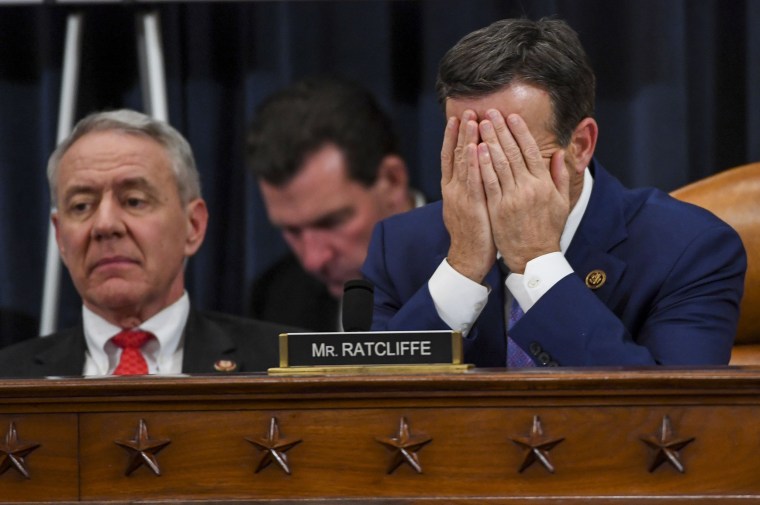On July 28, 2019, Donald Trump announced via Twitter that Rep. John Ratcliffe (R-Texas) was his choice to serve as the new director of National Intelligence. The president inexplicably described the Texan at the time as a "highly respected congressman," who'll "inspire greatness." Four days later, Trump told reporters, "I'm sure that he'll be able to do very well."
Not quite 24 hours later, Ratcliffe was out, overwhelmed by broad, bipartisan opposition. Even for a White House burdened by humiliating personnel fiascos, this was a cringe-worthy debacle.
Seven months later, Trump is ready for the sequel.
In what amounts to a direct challenge to Senate Republicans, President Donald Trump announced Friday that his pick to head the intelligence community is the same Republican congressman whose previous bid for the job collapsed amid revelations he misrepresented his background.
In case anyone's forgotten, no one, including GOP senators, seriously thought making John Ratcliffe the director of National Intelligence would be a good idea. As regular readers may recall, the case against him was bulletproof.
Almost immediately after Trump chose him for the job the first time, the public learned that Ratcliffe was caught repeatedly lying about his professional background. We also quickly realized that the Republican congressman didn't meet the statutory guidelines for the position.
Indeed, it wasn't surprising that there was bipartisan opposition to the president's choice: Ratcliffe is one of Congress' most far-right members, who's dabbled in silly conspiracy theories, and who's earned a reputation as a disengaged lawmaker who's made no meaningful connections during his brief congressional career with the intelligence agencies the president wants him to oversee.
Or put another way, Ratcliffe appears to be a rabid partisan, lacking in qualifications or credibility, who has no business serving as the nation's intelligence director.
When Trump initially chose him for the post, it was easy to explain the fiasco by pointing to the White House's reluctance to do any meaningful vetting of the president's nominees. But a half-year later, it's a different story: the president and his team know Ratcliffe is obviously the wrong choice, but they've decided not to care.
And why is that? First, it's important to recognize the desperation with which Trump wants to politicize the nation's intelligence operation. It's what prompted the president to go with Ric Grenell as the acting DNI, and it's obviously the rationale behind the Ratcliffe nomination.
The Texas Republican was part of the White House's semi-official "impeachment team" -- which means he was one of eight GOP attack dogs tasked with defending the president in the media -- which in Trump's mind, was perfect training to oversee the nation's intelligence community.
Second, as Steve Vladeck explained, even if the Senate balks at Ratcliffe's nomination, its existence will apparently allow Grenell to remain in his acting role for a longer period, giving him more time to "overhaul" the intelligence office in ways Trump will like.
And finally, I think the president may see some value in simply telling Senate Republicans what to do, with the expectation that they'll obediently follow his instructions. If recent history is any guide, Trump's assumption may very well be correct.


